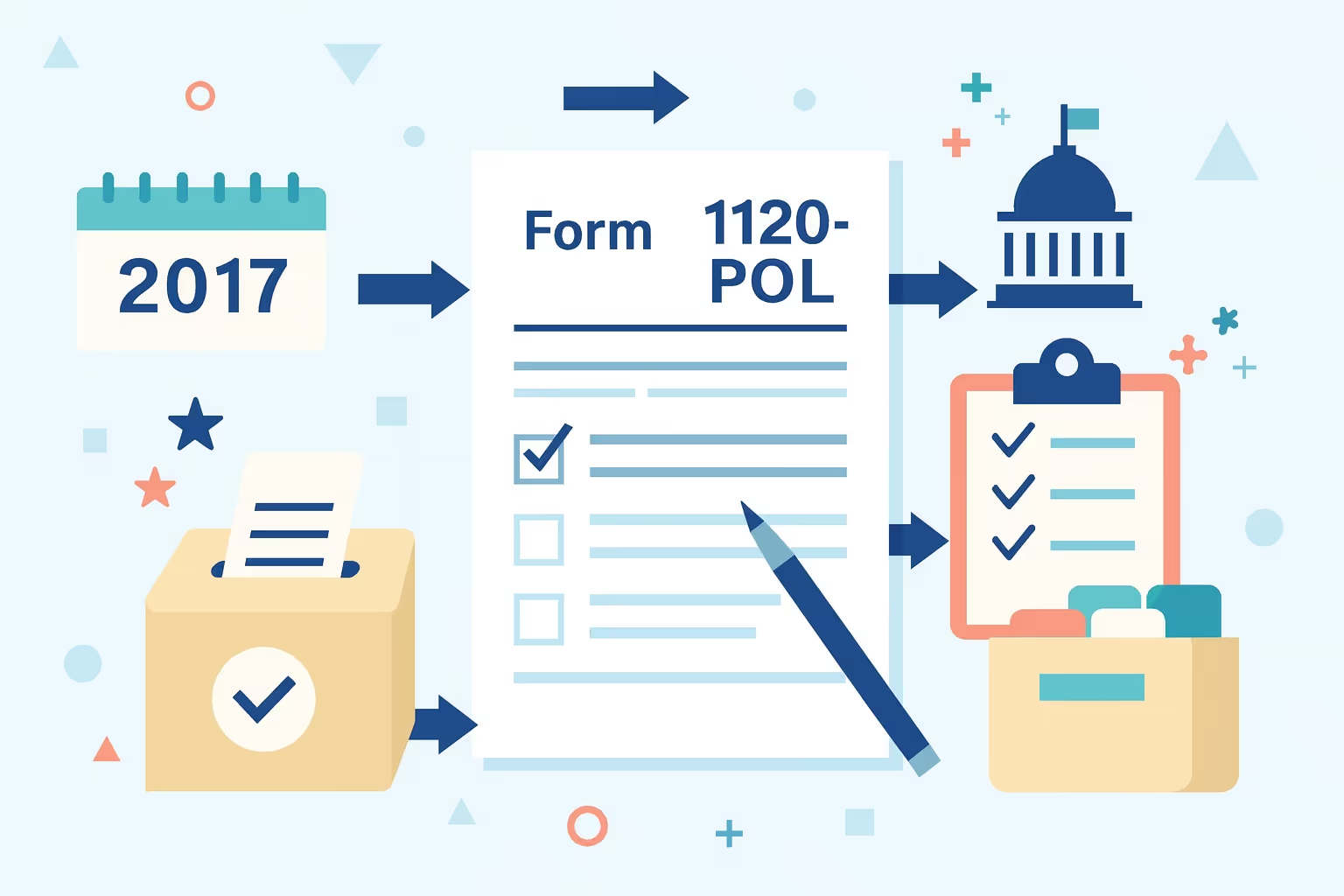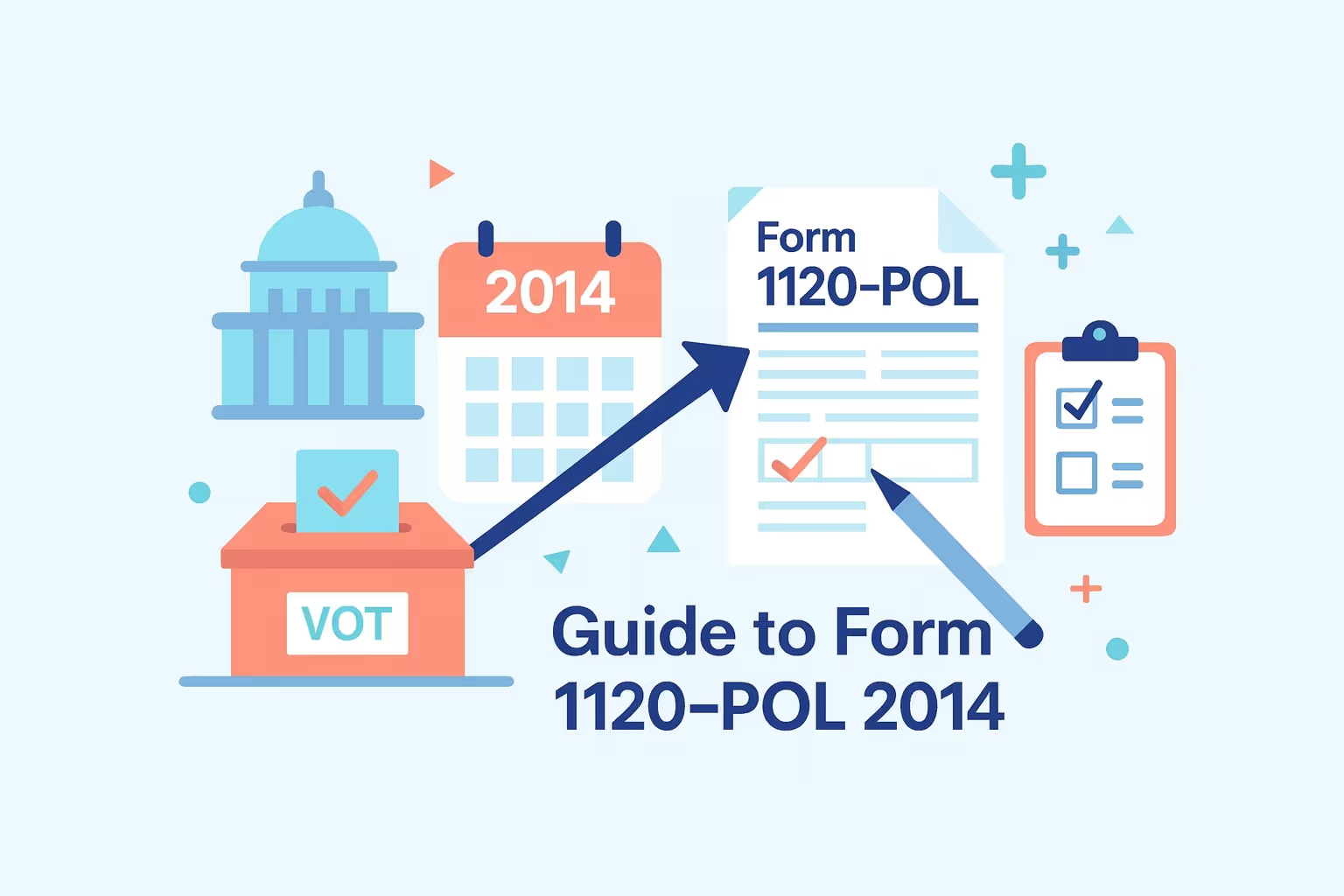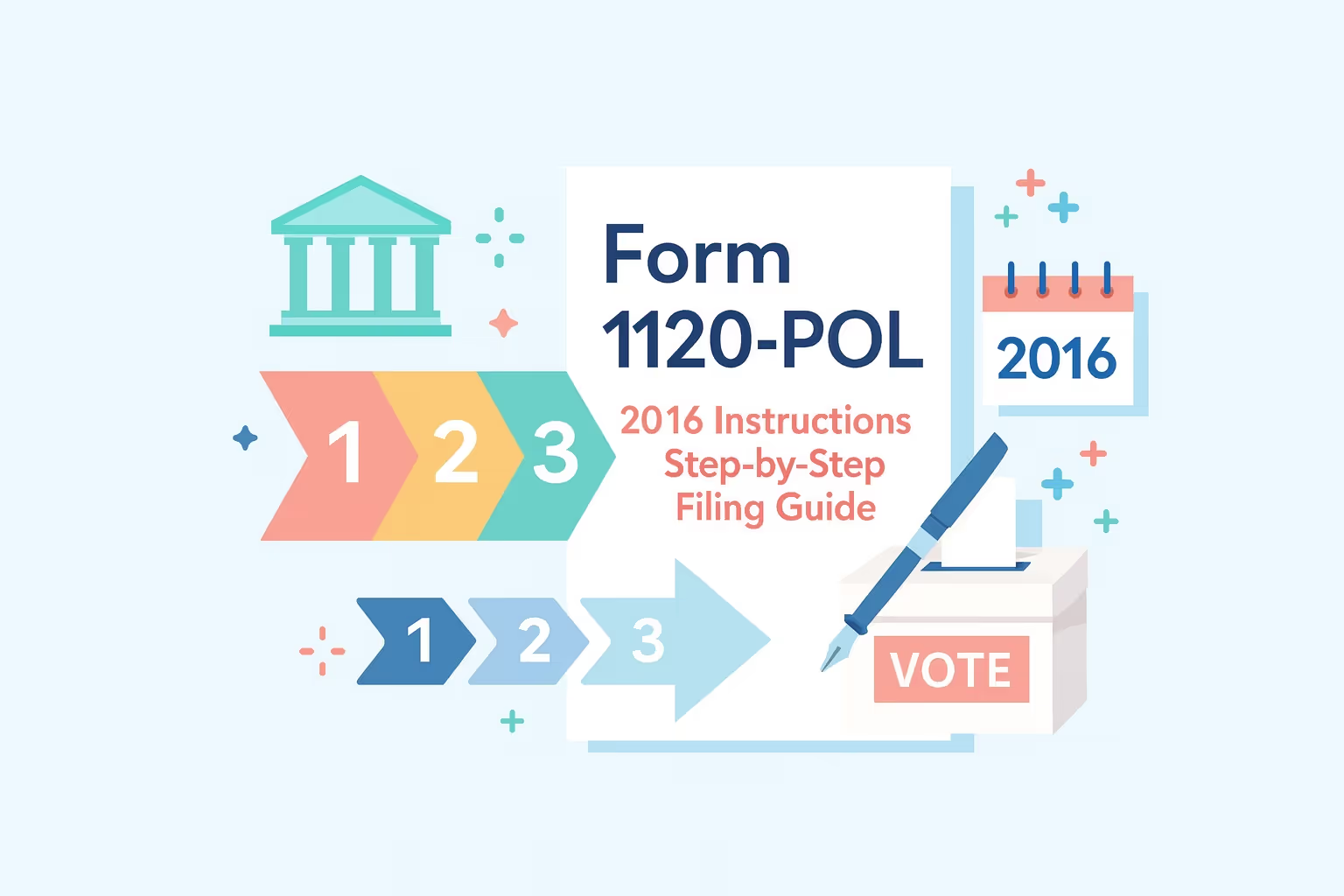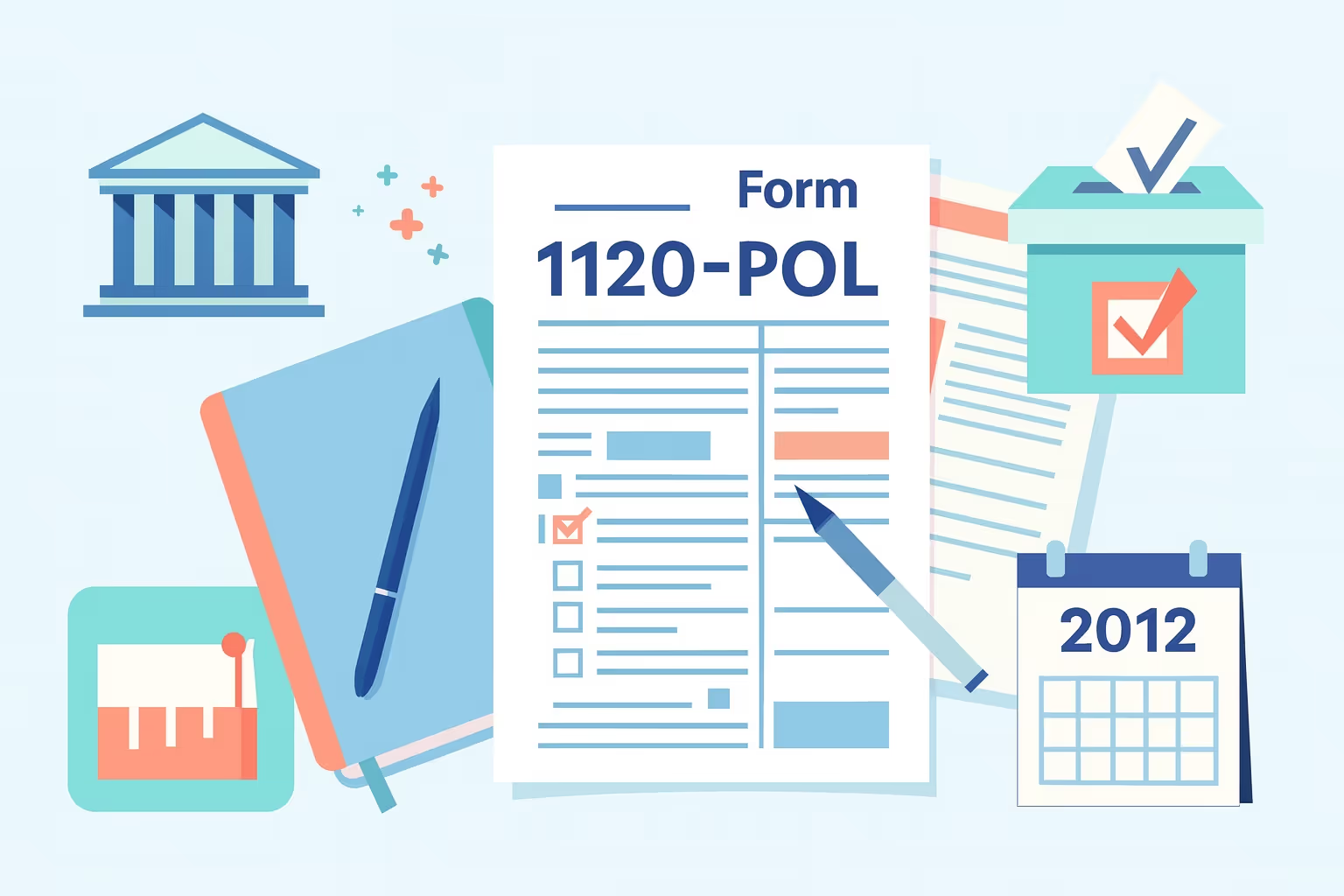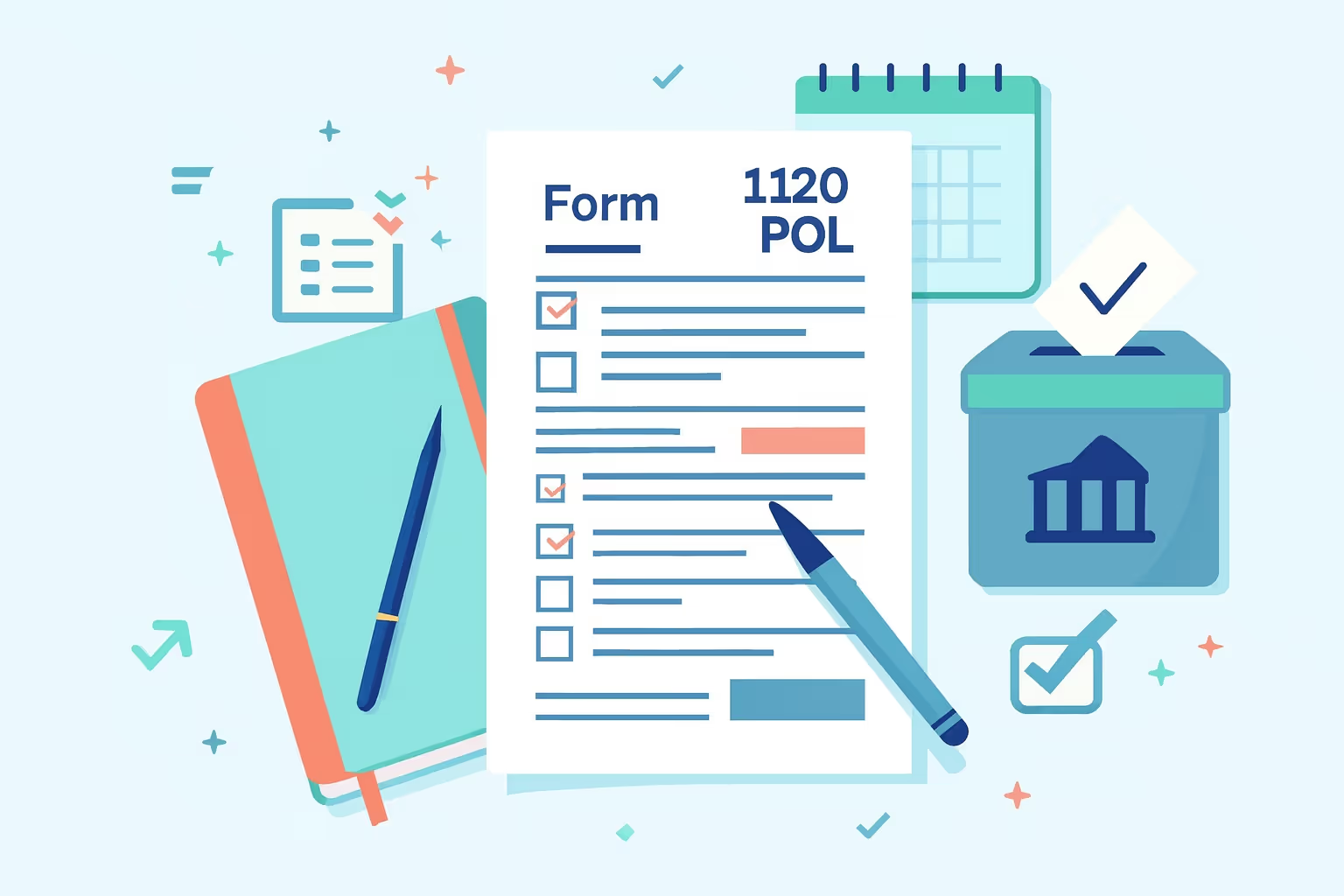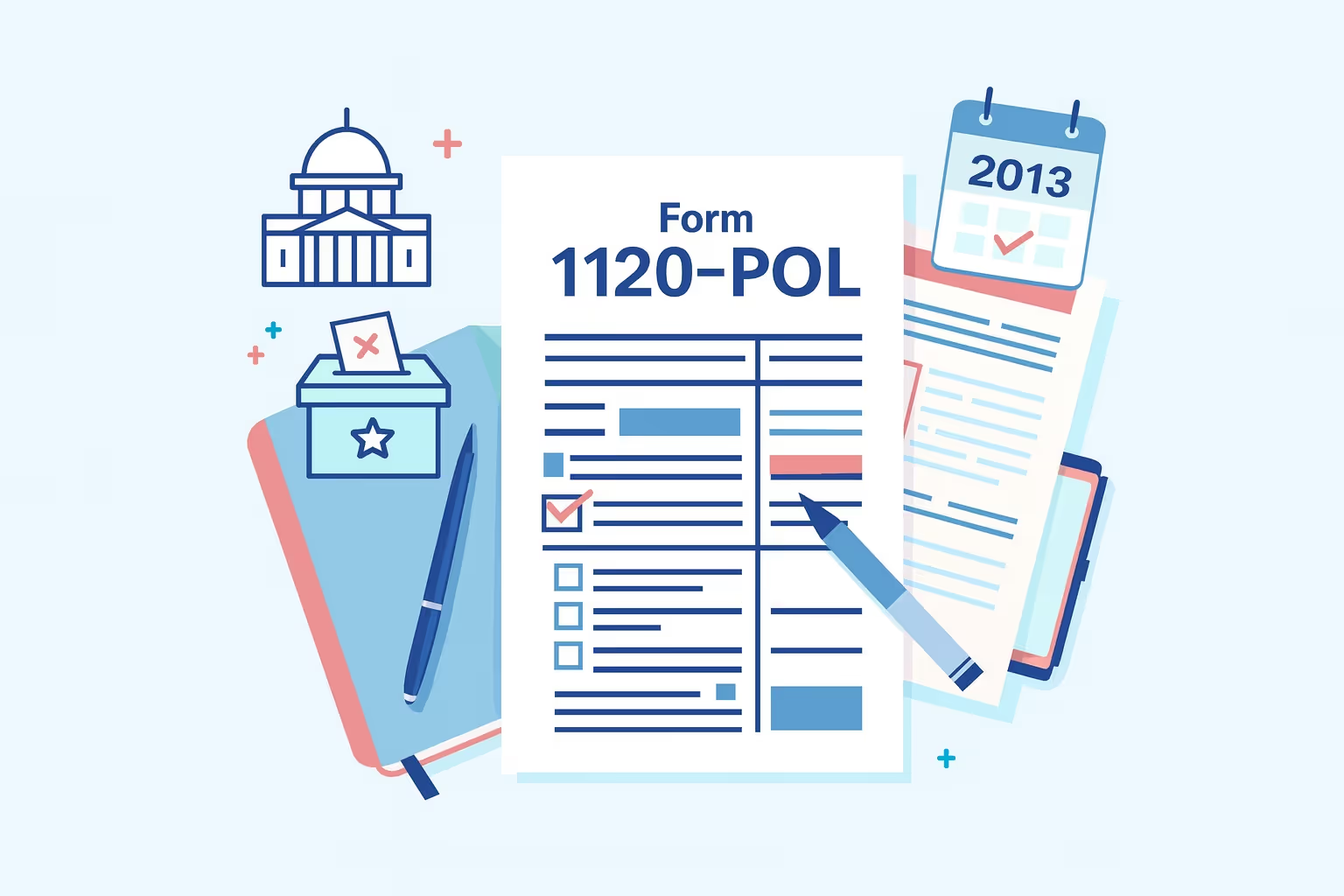
Form 1120-POL is a federal tax return designed for political organizations that earn taxable income from activities outside their exempt functions. While most contributions and donations used for political campaigns are not subject to income tax, revenue such as investment income, rental income, or other unrelated funds must be reported to the IRS. This filing requirement is part of the broader framework of federal law that ensures transparency and accountability in the raising and management of money during an election cycle.
For the 2013 tax year, organizations covered under the Federal Election Campaign Act, including political action committees, political parties, leadership PACs, and Super PACs, were required to follow updated rules when preparing their returns. The IRS provided Form 1120-POL 2013 instructions to clarify how taxable income should be calculated and how deductions such as expenses or mortgage interest may apply. These rules were necessary not only for compliance but also for helping taxpayers avoid penalties and properly manage funds used for campaigns at both the federal and state levels.
Because filing requirements can be complex, especially when organizations handle contributions, dividends, and independent expenditures, many groups relied on tax experts for guidance. Understanding the process helps candidates, committees, and other political leaders fulfill their obligations, maintain compliance with the Federal Election Commission, and ensure that their organizations receive the correct treatment under federal law. This guide aims to simplify the filing process, enabling organizations to navigate the rules with confidence and ease.
Understanding Form 1120-POL
Form 1120-POL, officially known as the U.S. Income Tax Return for Certain Political Organizations, is used to report taxable income earned by political entities from non-exempt activities. While funds raised for political campaigns are generally exempt, money from sources such as investments, property rentals, or other unrelated activities is subject to income tax. Filing this return ensures compliance with federal law and helps organizations maintain transparency with the IRS.
Who Must File Form 1120-POL?
The following groups are required to file if they earn taxable income of more than $100 in a tax year:
- Political parties at the federal, state, or local level must file when they meet the income threshold.
- Political action committees, including leadership PACs, hybrid PACs, and Super PACs, are required to file if they generate taxable funds.
- Campaign committees supporting federal candidates, Senate candidates, House candidates, and other political leaders must submit a return if they report taxable income.
- Newsletter funds, trade associations, labor unions, and other PACs with income beyond contributions must comply with filing requirements.
Political Organization Taxable Income Explained
Political organization taxable income includes:
- Interest earned from bank accounts and dividends from investments.
- Rental income from property not directly tied to campaign activities.
- Proceeds from fundraising efforts or services not related to exempt campaign purposes.
- Independent expenditures or money raised beyond campaign contributions that do not qualify as exempt.
Form 1120-POL serves as a critical safeguard to ensure that organizations, committees, and corporations engaged in political campaigns follow IRS rules while supporting candidates and managing funds. This understanding allows taxpayers and organizations to navigate filing obligations with greater clarity.
Key Updates for Tax Year 2013
For the 2013 tax year, several important updates affected how political organizations completed their tax filing obligations. These changes were designed to strengthen compliance and streamline payment processes for groups covered under the Federal Election Campaign Act.
- Electronic payments became mandatory through the Electronic Federal Tax Payment System (EFTPS). Paper checks were no longer accepted, and organizations had to register their accounts in advance to avoid delays.
- Penalties for late filing increased. The minimum penalty rose to $135 for returns filed more than 60 days late, while additional penalties reached up to 25 percent of the unpaid tax.
- E-filing restrictions remained in place. Certain returns, such as short-period filings or amended reports, could not be submitted electronically.
- Cross-reference requirements expanded. Organizations were expected to coordinate their filing with related forms, such as Form 8871 and Form 8872, to ensure accuracy and completeness of their submissions.
These updates highlighted the importance of complying promptly and preparing correctly. Political groups, including political action committees and trade associations, needed to adapt to these regulations to prevent penalties and stay eligible under federal law.
Preparing to File Form 1120-POL
Before completing Form 1120-POL, organizations must gather all necessary documentation and confirm their eligibility to file. Proper preparation prevents errors, delays, and unnecessary expenses.
Essential Documents Include
- Bank and investment statements showing income from interest, dividends, or property.
- Records of contributions, receipts, and money raised during the election cycle.
- Employer Identification Number (EIN) and prior year tax return.
- Form 8871 and Form 8872 confirmations when applicable.
- Documentation of expenses and deductions related to taxable activities.
Determining the Tax Year
- Calendar year filers report their income from January 1 to December 31, with a due date of March 15 of the following year.
- Fiscal year filers report based on their organization’s accounting year, with returns due on the 15th day of the third month following the end of the year.
By preparing thoroughly, political parties, PACs, and labor unions can complete their filing process more smoothly and demonstrate compliance with IRS requirements.
Step-by-Step Instructions to Complete the Form
The IRS provides detailed guidance on completing Form 1120-POL, enabling political organizations and committees to report their taxable income accurately. Following a structured process makes the filing task less overwhelming and helps organizations avoid costly errors.
Step 1: Complete the Header Information.
Organizations begin by filling out the header section of the form.
- Enter the full legal name exactly as registered with the Internal Revenue Service.
- Provide the complete mailing address and Employer Identification Number (EIN).
- Check the correct box if the return is final, amended, or involves a name or address change.
Accurate header information ensures the return is matched to the correct account and avoids delays in processing.
Step 2: Report Total Income.
Organizations must calculate all taxable income, excluding exempt function income such as campaign contributions. Common taxable income includes:
- Bank interest earned from accounts
- Dividends from investments
- Rental income from property unrelated to political campaigns
All income should be carefully recorded to provide a comprehensive financial picture.
Step 3: Apply Deductions.
Only expenses directly tied to generating taxable income are deductible. For example:
- Investment management fees may be deducted from dividends.
- Rental property expenses can be deducted against rental income.
Expenses related to political campaigns, such as advertising or fundraising, cannot be deducted against taxable income.
Step 4: Calculate Taxable Income.
After subtracting allowable deductions, organizations apply the standard $100 special deduction for all political entities. The remaining balance is the taxable income.
Step 5: Determine Tax Liability.
Most political organizations pay a flat tax of 35 percent on taxable income. However, principal campaign committees for federal candidates, including House candidates and Senate candidates, may qualify for graduated corporate tax rates:
- First $50,000 at 15 percent
- $50,001 to $75,000 at 25 percent
- Over $75,000 at 34 percent
Step 6: Enter Credits and Payments.
If the organization has already made estimated tax payments or is entitled to credits, these amounts should be included in the calculation. Credits may also apply to specific items such as federal fuel tax payments reported on Form 4136.
Step 7: Answer Additional Information Questions.
The form includes questions on foreign bank accounts, foreign trusts, and tax-exempt interest. These must be answered honestly, as they help the IRS confirm compliance with broader federal law and election regulations.
By following these steps, political parties, PACs, Super PACs, and other organizations can file Form 1120-POL with greater confidence. Accurate reporting reduces the risk of penalties and ensures compliance with IRS requirements that support transparency in political campaigns.
Filing Methods and Payment Process
For tax year 2013, most political organizations filed Form 1120-POL by mail because e-filing was restricted to only certain standard calendar year returns. Short-period returns, amended filings, and reports with adjustments could not be submitted electronically. Paper filings had to be mailed to the IRS service center based on whether the filer was domestic or international, and organizations were expected to include all required schedules and attachments in the correct order.
The IRS required that all tax payments be made through the Electronic Federal Tax Payment System (EFTPS). Organizations had to register in advance, schedule payments, and meet strict deadlines to avoid penalties. Payments can also be made via same-day wire transfers if necessary, although banks may charge additional fees. Using EFTPS ensured that payments were credited on time, allowing organizations, from PACs to political parties, to demonstrate full compliance with IRS requirements.
Required Schedules and Attachments
Certain forms and schedules must accompany Form 1120-POL depending on an organization’s activities. The IRS requires specific documents to ensure accurate reporting.
- Form 4136 is filed if the organization claims credit for federal fuel taxes.
- Form 8871 must be filed within 24 hours of formation by most political organizations to declare Section 527 status.
- Form 8872 reports contributions and expenditures and is required for groups with gross receipts above the reporting threshold.
- Form 990 or 990-EZ may be necessary if gross receipts exceed federal limits for political organizations.
The IRS requires these forms to be arranged in a specific order, with Form 4136 placed first, followed by schedules and other forms. Supporting statements must be attached last. This order ensures smooth processing and prevents unnecessary delays in the review process. Providing the correct schedules and attachments is critical for political committees, PACs, and other political parties to meet qualifications under federal law.
Recordkeeping and Compliance Requirements
Accurate recordkeeping is essential for political organizations filing Form 1120-POL. Proper documentation not only supports the calculations reported to the IRS but also helps demonstrate compliance with federal law and election regulations. Clear records reduce the risk of errors, audits, or penalties and provide transparency to the general public about how funds are managed.
Records to Maintain
Organizations should keep the following documents for at least four years after filing:
- Bank and investment account statements showing interest, dividends, or property income.
- Logs of contributions, receipts, and money raised during each election cycle.
- Documentation of expenses and deductions tied directly to taxable income.
- Copies of all filed forms, including Form 1120-POL, Form 8871, Form 8872, and Form 990 or 990-EZ.
- Contracts or agreements related to fundraising, property rentals, or other income sources.
Why Recordkeeping Matters?
Strong records allow organizations to respond quickly if questioned by the IRS or the Federal Election Commission. They also support compliance with state-level rules that may require additional reporting. By maintaining accurate records, political action committees, Super PACs, labor unions, and trade associations demonstrate that they are adhering to the rules governing the management of contributions, expenditures, and independent activities.
Good compliance practices reinforce public trust, help avoid unnecessary penalties, and allow organizations to focus on supporting candidates, campaigns, and other political leaders without disruption.
Common Mistakes to Avoid
Filing Form 1120-POL requires accuracy and close attention to IRS rules. Mistakes are common, but they can lead to penalties, rejected returns, or unnecessary tax payments. Understanding the most frequent errors helps organizations remain compliant.
- Some organizations mistakenly include exempt function income, such as campaign contributions or membership dues, as taxable income. These amounts are not taxable and should be excluded.
- Deductions are sometimes incorrectly applied to political campaign costs, fundraising events, or lobbying activities. Only expenses directly connected to producing taxable income may be deducted.
- Many organizations fail to enroll in the Electronic Federal Tax Payment System (EFTPS) in advance, which can result in late or missed tax payments. Setting up the system before the due date is required.
- Errors also occur when the wrong tax rate is applied. For the 2012 tax year, political organizations must calculate liability using the flat 35 percent rate rather than other rate structures.
- Filing Form 1120-POL when taxable income is under $100 is unnecessary. In these cases, the IRS does not require the organization to file a return.
By avoiding these mistakes, organizations save funds, prevent delays, and remain compliant with federal tax rules. In situations involving complex accounting or reporting, consulting a tax professional provides added confidence and ensures that the filing is reviewed correctly.
Special Situations and First-Time Filers
Some organizations encounter exceptional circumstances that may affect whether they are required to file a report. Dormant or inactive groups do not need to file Form 1120-POL if their taxable income is $100 or less. Even so, they should keep supporting records such as:
- Bank statements showing minimal activity.
- Contribution and receipt logs.
- Documentation proving taxable income does not exceed the threshold.
For organizations filing for the first time, preparation is key. They should:
- Obtain an Employer Identification Number (EIN) before filing.
- Separate exempt function income from taxable income in their records.
- Track receipts and deductions accurately.
- Establish a compliance calendar with all federal filing deadlines.
By following these steps, political parties, PACs, Super PACs, and hybrid PACs can minimize errors, meet federal law qualifications, and maintain transparency in their campaign and fundraising activities.
When to Seek Professional Help?
While many organizations can manage simple filings independently, some situations require assistance from tax experts to ensure accuracy and compliance with tax laws. The rules governing political organizations can be complex, particularly when navigating overlapping requirements from the IRS and the Federal Election Commission.
Situations Requiring Expert Help
Professional help may be necessary when:
- The organization has complex investment income, including dividends, property rentals, and mortgage interest.
- Multiple entities are involved, including PACs, Super PACs, hybrid PACs, and leadership PACs.
- The group engages in large-scale fundraising or independent expenditures across multiple election cycles.
- Both federal and state-level tax filing requirements apply simultaneously.
- Errors from prior filings need to be corrected through amended returns.
Benefits of Professional Services
Tax professionals can ensure the correct treatment of deductions, confirm eligibility for credits, and help organizations avoid penalties for late filing or underpayment of taxes. They also provide guidance in separating exempt function income from taxable income, which is critical for compliance. In many cases, experts help save organizations both money and time while reducing the risk of audit issues.
Seeking professional guidance is especially valuable for political parties, committees, and organizations that want to maintain transparency, comply with federal law, and focus on supporting candidates and campaigns.
Frequently Asked Questions
What are the instructions for Form 1120 POL 2013?
The Form 1120 POL 2013 instructions guide political organizations on how to complete their tax return when they earn taxable income outside of exempt campaign activities. The IRS requires committees, PACs, Super PACs, and other political organizations to report interest, dividends, and income from property. Following these rules ensures compliance with federal law, helps taxpayers avoid penalties, and allows organizations to qualify for the correct treatment under the tax filing process.
How does the Federal Election Campaign Act affect tax filing?
The Federal Election Campaign Act sets rules for contributions, solicitations, and independent expenditures. While it regulates fundraising and money raised during an election cycle, political organizations must still file Form 1120-POL with the IRS when they generate taxable income. Compliance ensures that PACs, leadership PACs, labor unions, and trade associations remain transparent and accountable while supporting federal candidates, Senate candidates, and House candidates.
Who must file a tax return using Form 1120-POL?
A tax return is required for any political party, campaign committee, or political action committee that earns more than $100 in taxable income. This includes PACs, hybrid PACs, Super PACs, and other PACs that raise funds through investments, dividends, or rental property. Even when exempt contributions are not taxed, organizations must report taxable income to the IRS to meet qualifications under federal law.
Can deductions such as mortgage interest or campaign expenses be claimed?
Deductions are limited to expenses directly tied to taxable income. Mortgage interest on investment properties and fees associated with dividend or rental accounts may qualify. However, campaign advertising, soliciting contributions, or other political expenses are not deductible. The IRS requires committees, corporations, and organizations to separate exempt function activities from taxable activities to ensure proper reporting and compliance with tax laws.
What role does the Federal Election Commission play in political campaigns?
The Federal Election Commission oversees federal election fundraising, contributions, and expenditures. While it enforces laws for candidates, Congress, and other political leaders, the IRS governs income tax reporting through forms such as Form 1120-POL. Political organizations, leadership PACs, and Super PACs must comply with both the FEC and the IRS. This dual system ensures that funds, receipts, and money are managed effectively during each election cycle at both the federal and state levels.
When should political organizations seek expert help for filing?
Expert help is recommended when organizations handle complex accounts, large fundraising operations, or multiple committees. Tax experts provide services that ensure compliance with IRS rules, help organizations maximize a refund or avoid penalties, and clarify deductions for corporations, employers, and trade associations. Professional guidance is essential for PACs, Super PACs, hybrid PACs, and leadership PACs managing unlimited amounts of money raised in campaigns.












